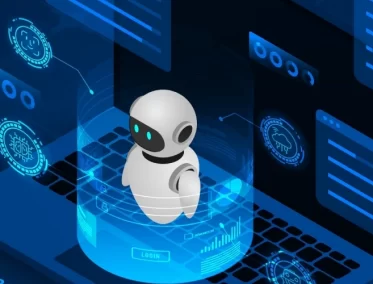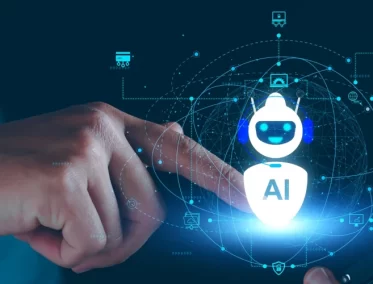Key Takeaways
- AI agents go beyond traditional automation as they can reason, act, and collaborate across enterprise systems to drive end-to-end workflow orchestration.
- Finance teams benefit from faster, more accurate closes as agents automate reconciliations, generate reports, and identify anomalies in real time.
- Cash flow forecasting becomes dynamic with AI agents continuously analyzing payment patterns and external data to predict liquidity risks.
- Sales teams gain productivity as agents qualify leads, generate proposals, and automate CRM updates, freeing time for relationship building.
- AI-powered HR onboarding streamlines employee experiences by automating documentation, setup, and training through conversational interfaces.
- HR leaders gain predictive insights into workforce planning, performance trends, and retention risks through continuous data analysis.
- Supply chains become more resilient with agents forecasting demand, managing procurement, and rerouting logistics proactively.
- AI agents enable sustainable operations by monitoring supplier compliance and recommending eco-friendly sourcing options.
- Integration is seamless as AI agents can plug into existing RPA, ERP, CRM, and workflow platforms via APIs without overhauling infrastructure.
- The future enterprise will be agentic, where humans and AI agents collaborate continuously to optimize outcomes and accelerate decision-making.
|
AI agents don’t just analyze data or automate simple tasks. They actively orchestrate workflows, make context-aware decisions, and collaborate with humans in real time. Unlike traditional automation tools or static chatbots, these autonomous agents use large language models (LLMs), domain data, and APIs to perceive, reason, and act, making them a transformative force across business functions such as finance, HR, and supply chain.
Let’s explore the benefits of AI agent workflow automation and the challenges in deploying them effectively.
What Makes AI Agents Different?
AI agents are not rule-based bots or pre-defined scripts. They are autonomous software entities that can:
- Interpret natural language inputs
- Access enterprise systems and contextual data
- Reason across multiple variables
- Take actions such as triggering workflows, updating systems, or generating reports
- Learn continuously from feedback and outcomes
In short, they behave like digital assistants capable of understanding goals, planning tasks, and collaborating with humans to achieve outcomes faster and more accurately.
For example, a finance AI agent can close books by reconciling ledgers, flagging discrepancies, and summarizing variances while interacting with ERP systems and auditors in natural language. Similarly, a supply chain agent can monitor inventory across regions, predict stockouts, and automatically create replenishment orders.
Finance: From Manual Reconciliation to Autonomous Operations
Finance departments have been early adopters of automation, but AI agents are taking this to a new level. They combine process automation, predictive analytics, and conversational intelligence to deliver true end-to-end efficiency.
Autonomous Financial Close
Traditional month-end close is time-consuming, requiring accountants to manually reconcile transactions, chase missing data, and validate journal entries. AI agents can now:
- Retrieve real-time data from multiple systems (ERP, CRM, procurement platforms)
- Match transactions and highlight anomalies
- Generate reconciliation reports automatically
- Collaborate with team members through chat interfaces
Instead of spending days closing books, teams can finalize them much faster and with greater accuracy.
Cash Flow Forecasting and Variance Analysis
AI agents trained on historical data, payment patterns, and external factors can generate dynamic cash flow forecasts that update continuously. They go beyond static reporting to explain variances, flag potential liquidity risks, and suggest corrective actions such as adjusting payment terms or optimizing receivables.
Continuous Audit and Compliance
By integrating with audit trails and regulatory databases, AI agents continuously monitor transactions for policy breaches or compliance risks. They automatically generate audit-ready reports, reducing fatigue and ensuring continuous readiness.
Impact: Finance leaders are seeing faster decision cycles, fewer manual errors, and stronger governance, allowing teams to focus on strategic insights rather than routine tasks.
Sales: From Lead Management to Deal Closure
Sales operations are another major beneficiary of agentic automation. AI agents in sales workflows improve efficiency by coordinating lead qualification, pipeline updates, and proposal generation in real time. They can:
- Capture and score leads based on CRM data, customer behavior, and conversation insights
- Draft personalized outreach emails or proposals using contextual product and pricing data
- Trigger downstream actions like updating deal status, scheduling demos, or notifying finance for quote approvals
- Analyze pipeline health and recommend actions to prevent deal stagnation
This orchestration helps reduce administrative effort, improve forecast accuracy, and give sales teams more time to focus on customers.
HR: From Administrative Tasks to Employee Experience
HR has long struggled to balance administrative efficiency and employee engagement. AI agents bridge that gap by acting as personalized digital assistants for both HR teams and employees.
Intelligent Onboarding
An HR AI agent can guide new hires through every onboarding step, from document submission and IT setup to payroll registration and training schedules, all through a single conversational interface. It can also integrate with backend systems to complete these tasks automatically. The result is a seamless onboarding journey that feels human, yet runs autonomously.
Talent Insights and Workforce Planning
AI agents analyze performance data, turnover trends, and skill gaps to forecast workforce needs. They recommend hiring strategies, internal mobility options, or learning pathways that help HR leaders move from reactive to predictive workforce management.
Employee Self-Service and Support
Instead of waiting for responses about benefits, leave, or policies, employees can interact with an HR agent around the clock. These agents understand context, access records securely, and resolve most routine requests autonomously.
Performance and Engagement Monitoring
AI agents analyze feedback forms, survey results, and collaboration data to detect early signs of burnout, disengagement, or attrition risk. HR leaders can intervene proactively to improve retention and morale.
Impact: HR teams are reporting noticeable reductions in administrative workload, faster response times, and better employee satisfaction. The function is evolving from service delivery to experience orchestration, guided by intelligent, data-driven insights.
Supply Chain: From Reactive Management to Predictive Autonomy
Disruptions, volatile demand, and fragmented data make supply chain agility difficult. AI agents are driving transformation by enabling autonomous decision-making across procurement, logistics, and inventory.
Demand Sensing and Forecasting
AI agents aggregate real-time data from sales, weather, social media trends, and economic indicators to generate near-term demand forecasts. When they detect sudden shifts such as a regional spike in demand, they trigger replenishment actions or alert planners automatically.
Intelligent Procurement
Procurement agents monitor supplier performance, pricing trends, and contract compliance. They can issue RFQs, evaluate bids using pre-set criteria, and even negotiate through AI-driven chat interfaces. This ensures faster sourcing cycles and more data-backed purchasing decisions.
Real-Time Logistics Orchestration
In logistics, agents track shipments across carriers, identify delays, and dynamically reroute deliveries using live data. They can notify customers, update ERP systems, and suggest alternative transport options without human intervention.
Sustainability and Risk Management
Modern supply chains face increasing pressure for ethical sourcing and carbon tracking. AI agents can monitor sustainability metrics, flag non-compliant suppliers, and recommend greener alternatives, supporting ESG compliance.
Impact: Organizations using AI agents in supply chain operations are reporting more responsive decision-making, lower operational costs, and greater resilience during disruptions.
Agentic Workflows Across the Enterprise
Whether in finance, HR, or supply chain, the true value of AI agents lies in how they connect fragmented workflows across systems. Unlike siloed automation tools, agents can coordinate activities end to end, breaking barriers between departments.
For example, a finance agent that detects a surge in purchase orders can alert a supply chain agent to check inventory and an HR agent to initiate temporary staffing.
Agents collaborate autonomously through shared APIs or orchestration platforms, ensuring business continuity even during disruptions. This collaboration enables agentic enterprises where AI entities and humans drive outcomes together. However, to realize these benefits, organizations must evolve both their infrastructure and their culture:
- Centralize and Cleanse Data: Agents need high-quality, accessible data to make reliable decisions.
- Adopt Secure API Frameworks: Seamless integration across ERP, CRM, and HR systems is critical.
- Implement Governance and Guardrails: Define clear boundaries for agent autonomy, escalation, and accountability.
- Promote Human-AI Collaboration: Train employees to work with agents, leveraging human judgment for oversight and creativity.
- Start Small and Scale Fast: Begin with high-impact use cases like reconciliation, onboarding, or order tracking, then expand across departments.
Integrating AI Agents into Existing Automation Software
Organizations don’t have to rebuild their workflow systems from scratch. AI agents can integrate with existing RPA tools such as UiPath, workflow platforms like ServiceNow, and enterprise applications like Oracle, Microsoft, or Salesforce through secure APIs.
- Identify repetitive processes involving decision-making or data retrieval.
- Deploy pre-trained or custom AI agents that can interpret natural language and interact through APIs.
- Use orchestration layers to manage collaboration between multiple agents and systems.
This approach allows organizations to layer intelligence on top of existing automation.
Conclusion
AI agents represent the next evolution of enterprise automation, moving from workflows designed by humans to workflows managed by intelligent systems.
- In finance, they’ll serve as intelligent controllers ensuring continuous compliance.
- In HR, they’ll act as experience managers that enhance employee engagement.
- In sales, they’ll help teams accelerate pipelines and close deals faster.
- And in supply chain, they’ll function as autonomous planners navigating complexity in real time.

Frequently Asked Questions (FAQs)
- How do AI agents improve efficiency in sales workflows?
They automate lead scoring, proposal generation, and CRM updates while providing real-time insights into pipeline health.
- How can AI agents be used for HR onboarding?
Custom LLM-based agents can manage documentation, IT setup, payroll registration, and training coordination.
- How can AI agents be integrated into existing workflow software?
Through secure APIs that connect them with RPA tools, ERP systems, and workflow platforms.
- What makes AI agents different from chatbots?
Unlike chatbots, AI agents can reason, access enterprise data, make decisions, and trigger actions autonomously.
- Are AI agents replacing human employees?
No, they augment human teams by handling repetitive and analytical work, allowing employees to focus on strategic and creative tasks.
- How can finance teams benefit from AI agents?
They can automate reconciliation, forecasting, and audit processes, improving accuracy and reducing cycle time.
- Do AI agents require advanced technical skills to deploy?
Most modern platforms offer plug-and-play integration through APIs and low-code orchestration, minimizing IT overhead.
- Can AI agents operate across multiple departments?
Yes. Agents in finance, HR, and supply chain can share data and coordinate actions, creating cross-functional efficiency.
- What challenges might arise when adopting AI agents?
Data silos, lack of governance frameworks, and resistance to change are common hurdles that require planning and training.
- How can organizations start implementing AI agents?
Begin with high-impact, repetitive workflows like invoice reconciliation or employee onboarding, and expand as adoption matures.




